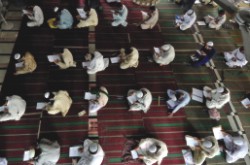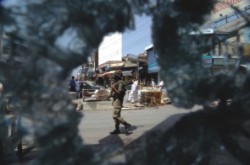Neighbours

General (retd) Mirza Aslam Beg

During the last 30 years, external aggression, counter-aggression and induced conflicts, have kept our region in a state of turmoil, creating global impact, which are no less than the impact created by World War II. For example, Soviet occupation of Afghanistan and the Eight Years War of Liberation, leading to Soviet withdrawal and its break-up; the Eight Year Iran-Iraq war; the Ten Year Afghan civil war; the 1991 Gulf War; Invasion of Afghanistan in 2001; Invasion of Iraq in 2003, Israeli war on Lebanon in 2005, and 2008 war on Gaza, and the on-going brutal war in Afghanistan, are the cataclysmic events, which have changed the course of history.
In these 30 years of conflict more than 70,00,000 thousand Muslims have been killed, thus defining a clear line between "the oppressors and the oppressed," inviting 'Divine Intervention' on behalf of the oppressed. There are two recent examples of Divine Intervention: Hitler, drunk with power, and obsessed with the notion of Lebensraum, struck, and disturbed world peace. The oppressed, formed 'a coalition', to defeat the evil. Within a period of 15 years, the Germans and their allies were defeated and decimated. Similarly, after the break-up of the Soviet Union, the Americans struck the Muslim World, to establish their global primacy and pre-eminence. The Divine Intervention in the form of Global Islamic Resistance, grew from the soil of Pakistan and Afghanistan and within a period of 15 years, it has curbed the ambitions of the oppressors.
The Islamic Resistance grew from the Pak-Afghan soil, along the Durand Line. The Pashtuns provided the hardcore of resistance and "Jehadis from 70 countries of the world joined them, whose only objective was and, is freedom" - freedom of Afghanistan, freedom of Iraq, Palestine, Lebanon and Kashmir. They do not believe in establishing Islamic rule over other countries. They were not involved in 9/11 act of terror either, nor in any terror act elsewhere. Al-Qaeda having a different identity, targets the 'oppressors' outside the zone of conflict. As a result of this conflict the 'Pashtun power' has emerged and extends from Pakistan to the Hindukush mountains. The former US Security Advisor, David Kilkullen, terms it as "the greatest threat to American interests in the region," and wants it to be eliminated. Similarly the Shia Power has emerged from Iran to Iraq to Bahrain, Saudi Arabia and Pakistan, and the US plans to pitch it against the 'Pakhtun power', and also against the Sunni Muslim States of the Gulf region, whom, the Americans have already sold US$120b worth of military hardware, to fight the Shia power/Iran.
The unipolar world order now is Tri-polar, because the Global Islamic Resistance has been able to curb the US ambitions of "global primacy and pre-eminence", while Russia and China form the third force. Thus, it is the Global Islamic Resistance which is determining the contours of the emerging world order.
 There are terrorists, no doubt, like Al-Qaeda and many other splinter groups, growing out of the freedom movements. Such terrorists, we also have in Pakistan, who call themselves Taliban, just to raise their status, whereas they are not Taliban. They are our angry tribals from Waziristan, Swat, Dir and Bajaur, joined by criminal gangs of the poverty-stricken border regions of Pakistan, against whom, Pakistan military is now engaged to establish the writ of the government, In fact, the occupation forces in Afghanistan by design have been able to 'reverse the war on Pakistan'. There are terrorists, no doubt, like Al-Qaeda and many other splinter groups, growing out of the freedom movements. Such terrorists, we also have in Pakistan, who call themselves Taliban, just to raise their status, whereas they are not Taliban. They are our angry tribals from Waziristan, Swat, Dir and Bajaur, joined by criminal gangs of the poverty-stricken border regions of Pakistan, against whom, Pakistan military is now engaged to establish the writ of the government, In fact, the occupation forces in Afghanistan by design have been able to 'reverse the war on Pakistan'.
The 'geo-political balance' of the region has been altered with the induction of India and EU into Afghanistan, which USA now considers part of South Asia and under the hegemony of India. India, in collusion with the occupation forces in Afghanistan, has been able to establish a vast spy network operating against all the neighbours, particularly Pakistan, Iran and China. Thus the cause of all the trouble in the region, and "the Mother of All Evil" is the occupation of Afghanistan, by the foreign forces.
The occupation forces are facing tough resistance, which is stronger, more organised and better armed than the resistance the Soviets had to face, during the '80s. The resistance now calls itself the 'Shadow Army' organised into several divisions, and each division consists of a number of Lashkars. The 'Shadow Army' comprises, the old mujahideen who fought against the Soviets in Afghanistan; the Afghan Taliban, mostly born under the shadow of war; veterans from Iraq; old and new volunteers from several countries of the world and the 005 Brigade of Al-Qaeda. It's a formidable force, undertaking large size operations, inflicting over 250 casualties on the occupation forces, in a period of two months. The next few months are crucial. The military adventure is thus failing and saner voices are getting louder and clearer, telling Obama and their allies to change their strategy in Afghanistan.
"The troops are tired and the American people are pretty tired of war in Afghanistan," said Gates. "The situation in Afghanistan has got progressively worse, and the Taliban has got much better, much more violent and much more organised....The Afghan people are much more uncertain now, about their future, " said Admiral Mullen. "Is Afghanistan destined to follow Viet Nam, as another graveyard for US Empire," questioned Martin and R Hertzberg. "Obama's Petraeus - McChrystal policies, in Afghanistan, are a fundamental strategic error..." maintained Chomsky. "We are losing in Afghanistan. US-NATO led coalition faces defeat, and our young men are dying out there," said Paddy Ashdown. The one thing we cannot do is, to go on as we are, led by events. History is littered with the graves of the soldiers who died obeying the call," stated Hamilton. "Obama cannot manage an inherently doomed premise. Colonialism is dead. Occupiers will never enjoy peace in Afghanistan," claimed Ted Rall.
Obama, therefore suggests: "All of us want an effective exit strategy from Afghanistan" - the crucible of terror, the graveyard of invaders.
 The economic melt-down, and the shame of defeat in Iraq and Afghanistan, leaves only one hopeless course open to US, as William Pfaff rightly suggests: "The US has become war-addicted. War has become part of the national identity, as well as the national economy, which turns out more weapons and more military high technology than the rest of the world combined. The growing opinion in Europe is that Afghanistan is the US's new Viet Nam. The truth is that it is worse than Viet Nam. In Viet Nam, the US had a clearly identified enemy, supported by a responsible Communist state in North Viet Nam with its government in Hanoi. The US had a theory about what it was doing suppressing the insurrection in the South, and bombing North Viet Nam until the government stopped the war. All of this was, in principle, possible. However, the US acted on a nonsensical theory about the world 'going Communist' if the US didn't win, just as today the US has an even more nonsensical theory about radical Islam conquering Muslim Asia and all of Europe and then attacking the US, if Washington fails. In that respect it's a war of ideas which the US has no theory about how to 'win'." The economic melt-down, and the shame of defeat in Iraq and Afghanistan, leaves only one hopeless course open to US, as William Pfaff rightly suggests: "The US has become war-addicted. War has become part of the national identity, as well as the national economy, which turns out more weapons and more military high technology than the rest of the world combined. The growing opinion in Europe is that Afghanistan is the US's new Viet Nam. The truth is that it is worse than Viet Nam. In Viet Nam, the US had a clearly identified enemy, supported by a responsible Communist state in North Viet Nam with its government in Hanoi. The US had a theory about what it was doing suppressing the insurrection in the South, and bombing North Viet Nam until the government stopped the war. All of this was, in principle, possible. However, the US acted on a nonsensical theory about the world 'going Communist' if the US didn't win, just as today the US has an even more nonsensical theory about radical Islam conquering Muslim Asia and all of Europe and then attacking the US, if Washington fails. In that respect it's a war of ideas which the US has no theory about how to 'win'."
America is on the wrong side of history, which is imperceptibly changing towards a global order based on the quintessential values of respect for diversity and renunciation of war. On the contrary, China is one country, which is peacefully engaging itself with all the nations, honouring their sovereignty and building paradigm of peaceful co-existence. India and EU unfortunately have opted to be on the other side of the divide. The Americans together with their allies, therefore, need to develop a pragmatic AfPak Strategy, and to establish "a more ordered world at a time of great instability. The world powers have to provide space at the top tables for nations, that do not share our culture, our history, our world view and even our values." - Ashdown.
This article was first published in The Nation (Pakistan).
The writer is the former Chief of Army Staff of the Pakistan Army.
Copyright
(R) thedailystar.net 2009 |
